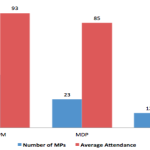The current local government system deprives one-third of the electorate of true representation, governance NGO Transparency Maldives (TM) has said.
One-third of the electorate base their living in the capital city Malé or in other islands, however, they are only allowed to vote in their permanent or registered constituency, TM noted in a position paper on today’s local government elections.
Hence, the current system “deprives” one-third of the electorate of true representation and “defeats” the purpose of a decentralised administrative system.
“The only way to achieve true representation would be to pave the way for people to vote in the constituencies where they actually live. This is the basic tenet of decentralisation, and it empowers people to hold local councils accountable for decisions that directly affect their lives,” the NGO recommended.
The position paper also called attention to three additional issues in the current electoral system – application of the Supreme Court’s 16-point electoral guideline, the electoral dispute resolution mechanism and ensuring secrecy of the ballot.
Supreme Court’s guidelines
TM said it does not believe the Supreme Court’s guideline improves the existing legal framework on electoral administration.
The Supreme Court issued the guideline in its verdict annulling the first round of presidential polls held in September 2013. The guidelines mandate candidate signatures on the voter registry, use of the Home Ministry’s Department of National Registration’s (DNR) database to compile a new registry, and police oversight on transport of ballot papers and boxes.
In October 2013, the Maldives Police Service obstructed polls at the eleventh hour after the Progressive Party of the Maldives (PPM) and the Jumhooree Party (JP) refused to sign the voter lists.
Transparency Maldives has expressed concern over the opportunity provided by the guideline for political parties and candidates to obstruct the electoral process and said the guideline undermines the independence of the EC in organising and administering elections free from undue external influences.
“The People’s Majlis is mandated with making and amending laws, and hence the Majlis must immediately review the Supreme Court’s 16-point guideline and authorities should revert to using the existing legal electoral framework,” the NGO recommended.
The Commonwealth Observer Group who monitored the presidential polls has also called upon the Majlis to examine the consistency and workability of the guideline.
The guideline “appeared to undermine the authority of the Election Commission, were inconsistent with or contrary to electoral law, and were at odds with the constitution,” the Observer Group said in its final report.
In addition, TM has also called for greater cooperation between the EC, the Maldives Police Services, the Anti Corruption Commission (ACC), the Maldives Broadcasting Commission (MBC), the Prosecutor General, and the Majlis in establishing accountability mechanisms to address transparency in political financing, bribery, vote buying, misuse of state resources for campaigning, and violations of the code of conduct on campaigning.
Secrecy of the ballot is not ensured in the local government and parliamentary elections, in situations where one of a few individuals have to register to vote in polling stations other than their constituencies, such as in resorts and industrial islands, TM said.
Transparency Maldives has recommended the setting up of a mechanism to ensure secrecy of the ballot for all citizens who have to vote away from their constituencies.
 (0)Dislikes
(0)Dislikes (0)
(0)



